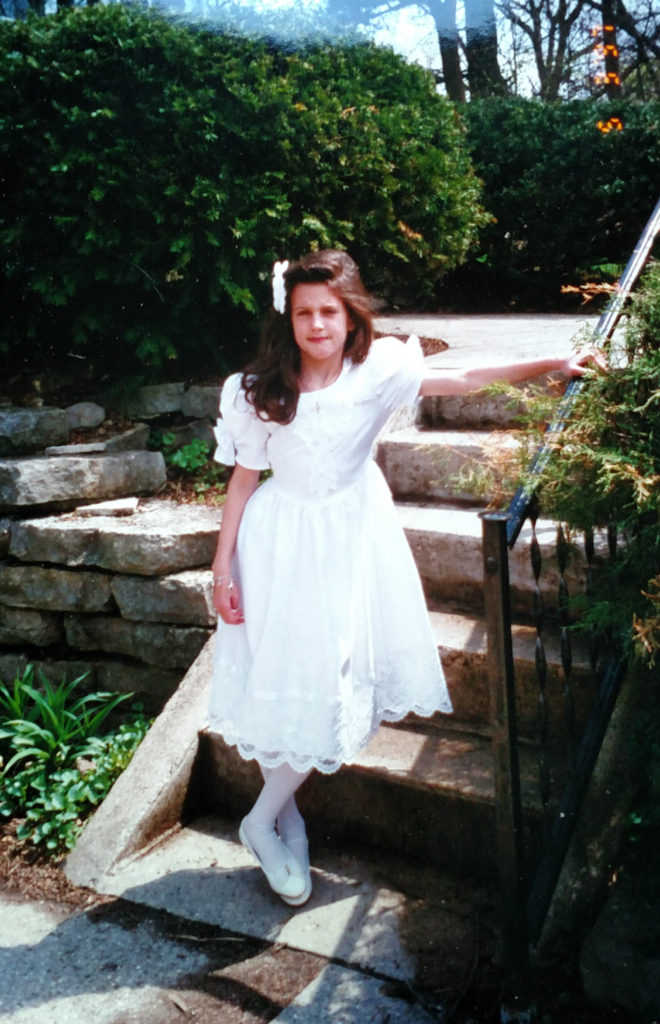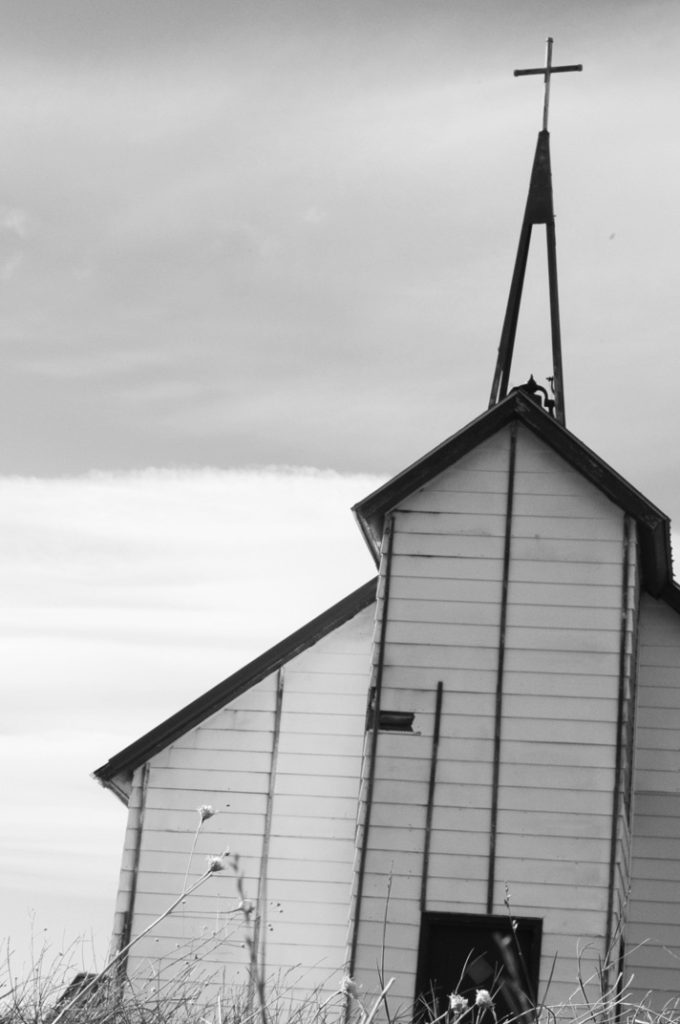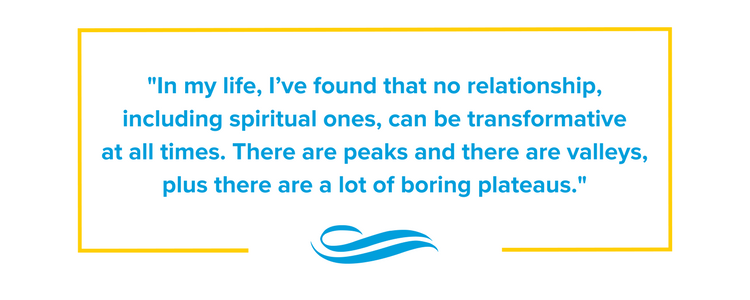Growing up, I was the only kid I knew who went to church every single week. While everyone else was sleeping in, I was listening to homilies and tossing carefully saved allowance money into the collection basket. Concerned over my best friend’s lack of faith, I once hosted a mini-Mass when I was in third grade. My basement was the church, graham crackers served as communion wafers, and an old curtain became my vestment. “THE BODY OF CHRIST,” I thundered, before giving her loud whisper commands on how to properly accept the cracker.
Despite my gung-ho attitude toward evangelism, my enthusiasm for Mass stopped around 7:40 a.m. on Sunday mornings when I’d be rudely awakened from deep slumber and forced into dress clothes. Most of Mass was spent figuring out how to pinch my sister without getting caught—a feat I rarely accomplished. More than one service ended (for me) by being dragged out of the sanctuary, loud protests on my lips of how I HADN’T EVEN REALLY PINCHED HER THAT HARD.
Clearly, I was filled with the Holy Spirit.

Like many people I’ve since met, I went to church as a child because I had to go to church. Catholicism has a lot of steps—Baptism, First Communion, Reconciliation, Confirmation—and each step requires a lot of work on the front end. Leading up to Confirmation year, my Sunday school peers and I were offered two options—attend a series of religious talks and events throughout the school year, or knock all the requirements out of the way with a two-week church trip out to Montana.
Being no fool, I immediately signed up for the trip and started saving allowances, babysitting cash, and birthday money to pay for it. The trip was an incredibly moving, tear-filled experience, and not just because we traveled 2,500 miles round trip in a minivan caravan crammed full of high school students. The trip was an eye-opener, to be sure. In addition to praying before meals, we had new things, like prayer circles, Bible studies, and journaling prompts. We were encouraged to share how we were feeling God’s presence on the trip. It was the first time I’d ever really been challenged to see my faith as an opportunity rather than a requirement. I emerged from the trip dewy-eyed and with minimal doubt. Of course, God existed! Of course, Jesus was His son!
Experiences like these are wonderful—and necessary—but they’re not sustainable. In my life, I’ve found that no relationship, including spiritual ones, can be transformative at all times. There are peaks and there are valleys, plus there are a lot of boring plateaus.
Let’s just get there
Apparently, I wasn’t the only millennial to feel skeptical about what I’d been brought up to believe. Research shows that “just 27% of Millennials say they attend religious services on a weekly basis, a substantially lower share than Baby Boomers (38%) and members of the Silent and Greatest generations (51% each).”
I wasn’t sure if I identified with Catholicism and its teachings, but I was pretty sure I still believed in God. “I just want my kids to have a relationship with God,” my mom, who has always been Catholic, once told me. “They don’t necessarily need to be Catholic.” I figured college was as good of a time as any to figure this whole religion thing out and decided to give nondenominational worship a try.
The members of my new Christian group did things like lift their hands while singing. The music consisted of a lot of guitars, some drums, and PowerPoint slideshows of lyrics set against lush forest backdrops. As a lifelong Catholic, I was both terrified and transfixed. Wedged in the farthest back corner of the room possible, I kept my hands plastered to my sides.
Did these people ever doubt their faith? I often wondered. Is there something wrong with me? Blessed with a hearty dose of doubt regarding just about everything I’d ever done or believed in, I spent a lot of time pondering the possibility of Jesus’ existence. Also known as, you know, the core belief of Christianity.
A 2008 study by Georgetown University’s Center for Applied Research in the Apostolate confirmed I wasn’t the only one struggling. Thirty-one percent of millennials surveyed said they sometimes or frequently had doubts about the existence of God.
As a fairly practical person, I like using concrete evidence to back my beliefs and I was having some difficulties finding concrete evidence to prove that Jesus was the son of God. Perhaps I should have taken some time to myself during this doubtful period. Instead, I signed on to help lead nondenominational worship services in National Parks. Today’s message is brought to you by your friendly 20-something-year-old agnostic worship leader! And don’t forget to give when the collection basket makes its rounds!
I felt a bit like a fraud, but at least I was having fun hiking throughout the park during my downtime. The summer introduced me to loads of fascinating people, like my buddy Eric. Eric had just graduated from a Christian college and was hoping to enter seminary. He showed me you could both be Christian and have an interesting life. That summer, I learned you could question and embrace your faith simultaneously. I learned that faith doesn’t have to be transformative every day, nor do transformations need to be earth-shattering. Often, when I look back, the little things that happened—the impromptu conversations over dinner with new people, friends sharing their own faith stories, and saying “yes” to opportunities that I used to shy away from out of fear—are the memories that made the biggest transformations in the long run.
During that summer, Eric was quick to remind me that life was about the journey, not the destination, and I was quick to remind him how much I hated that quote. “How about we just get to the lake in a timely fashion?” I’d hiss on one of the many meandering hikes when he’d bring that quote up. Those hikes were scarily similar to my religious journey. Let’s just get there already, OK?
Finding my spiritual fit
I returned from the mountains and called it quits with the nondenominational group. Like any relationship, I took a great deal away from it—mainly that God is more than a set of rigid rules. Despite this takeaway, I realized I needed to address my doubts in a different environment. Plus, strangely enough, I missed some of the traditional aspects found in Catholicism. Shortly after returning from the park to the city, I wound up in the pews of a Congregational church. Like the Catholic Church, my new pastors wore vestments, but rainbow flags decorated the doors, the smell of warm communion bread drifted among congregants during services, and readings included non-Christian texts.
Similar to the previous experiences, I entered dewy-eyed and excited. Now here was a church that gets it! I thought excitedly. This church was engaged in social justice issues at a local level. Congregants were pleasant, yet kept a distance that my Catholic core respected mightily. I joined an ecumenical young adult discussion group. It felt OK to doubt.
Like all of my previous religious experiences, however, the newness of the church eventually wore off, and once again I found myself grappling with what my beliefs were and if there was enough substance to support my relationship with this new church. What do I even believe to be true?

Naturally, the easiest choice to make was to ignore all my questions and leave both the church and Montana behind. Shortly after graduating from college, I received a job offer from an organization in Kansas, and I hightailed it down to Wichita. There, I attended a Catholic church; not so much because I felt called there spiritually, but more so because I felt called by its convenient one-block walk from my house.
The church wasn’t the best fit, but I attended dutifully nearly every week for two years. Like the mature adult I was, I often hid in the choir loft during Mass. It offered enough privacy where I could take off my shoes and also make faces during the homilies at things I disagreed with.
Faith at its finest.
While doubts and frustration still lingered in my mind, I did have a spectacular view of the entire church from that Kansas choir loft. Mass was frequently attended by an order of Catholic sisters. Every Sunday at 8 a.m., I’d gaze from my hideout over a sea of blue habit-wearing sisters lining the first three rows of the church.
In addition to the order of sisters at my church, there was a separate order living just a few doors away from me and a whole slew of sisters from a completely different order living a scant mile down the road. Being new to the state, I decided I could use some new friends and set about befriending Catholic sisters throughout Kansas.
The Catholic sisters I met were independent, thoughtful, whip-smart, and seemingly unflappable. They knew all about world events and gardening techniques. They took action on issues like human trafficking, voter registration, and environmentalism. Several were artists. More than a few were fierce card sharks. One order owned a herd of alpacas and spun the fiber into yarn. They never seemed to rest. These women lived incredibly interesting and faith-filled lives.
Even their prayers were relatable. “I just pray that the Catholic Church leaves the 16th century and enters the 21st,” one of the sisters shared during prayer circle. I froze. The heavens opened straight through the ceiling. Light poured through. Catholicism suddenly seemed more relatable. I was getting to know Catholic leaders and believers, and I was watching firsthand how their faith meant more than reciting prayers and following rules.
I credit Catholic sisters for helping me rediscover Catholicism by looking for the pieces that I could relate to and examining the pieces I couldn’t. I’ll likely always have doubts and disagreements with both Christianity and the Catholic Church—I am a millennial, after all.
Each experience has been important in my faith journey, even though my journey seems to never reach its destination. My high school trip showed me the power of transformative events. My time in national parks reminded me that these events don’t happen often, but smaller, meaningful moments happen every day. The nondenominational group taught me to form a relationship with God while my temporary college church taught me it was OK to doubt. The Catholic Church showed me I could doubt it, leave it, and still return, ready to explore, challenge, and embrace it all at the same time.
